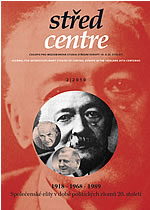V siločarách nové střední Evropy. Koncepce a tvorba zahraniční politiky Slovenské republiky v prvním desetiletí její existence
In the gravitational field of the new Central Europe: Concepts and Implementation of the Foreign Policy of the Slovak Republic in Its First Decade.
Author(s): Miroslav KunštátSubject(s): History
Published by: AV ČR - Akademie věd České republiky - Masarykův ústav
Keywords: Central Europe; Slovak Republik; Foreign Policy
Summary/Abstract: The article deals with the foreign policy of the Slovak Republic in the fi rst decade of its existence ( from its establishment in 1993 to Slovakia’s accession to the NATO and EU in 2004). The study summarizes the initial phase of the independent Slovak foreign policy even before the dissolution of the Czechoslovak Federation and the grounding of its constitutional and institutional foundations. Particular attention is paid to the issue of potential conceptual and practical alternatives to pro-Western orientation of this country. Particularly the years 1993–1998 (2nd a 3rd government of the Prime Minister Vladimír Mečiar) showed some signs of Slovak Sonderweg in the Central European region. Discrepancies regarding the foreign policy orientations were rooted in an older discourse, and especially in the positions of the new political elites on the division of Czechoslovakia, or better to say, to the establishment of independent Slovakia. In addition to the division of Slovak society in the right and left its secondary division into the fans and opponents of an independent state also determined foreign policy debates in the 1990’s. In his historical-political approach, based also on the discursive critique, the author examines the external and internal factors shaping the Slovak foreign policy, i.e. in particular the dynamics, which on the one hand resulted from the attractiveness of NATO and the EU (and of the Western orientation in general) but on the other hand was based on the anti-liberal and nationalist political traditions and tendencies that were very significant and influential in Slovakia in that period. Attention is also paid to the development of views on cooperation in Central Europe (Visegrád-Group), the Slovak-Czech relations, Slovak-Hungarian relations and relations with Russia. In conclusion, the author deals with the Slovak refl ection of European integration policy and European dimension of modern Slovak identity. The author considers this period as constitutive for the stabilization of Slovak foreign policy identity and foreign political culture.: in 2002–2006 (the second government of Prime Minister Mikulas Dzurinda) the basic foreign-policy consensus was found across all significant political parties. Although Slovakia seems to be firmly anchored in European integration structures, some relics of the past still persist, especially in the Slovak-Hungarian relations.
Journal: Střed. Časopis pro mezioborová studia Střední Evropy 19. a 20. století
- Issue Year: 2/2010
- Issue No: 2
- Page Range: 82-118
- Page Count: 37
- Language: Czech

